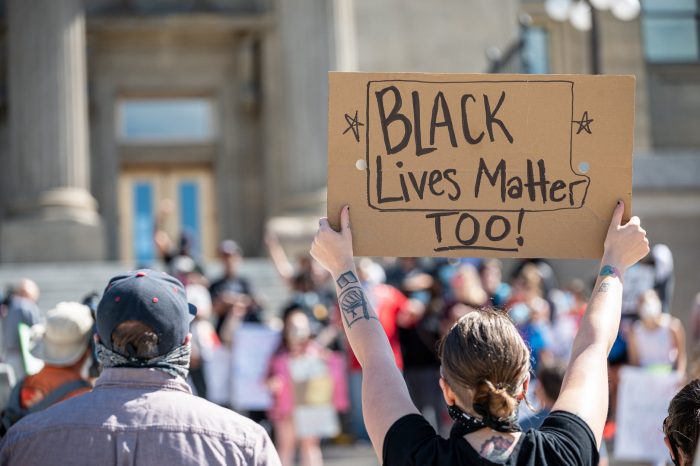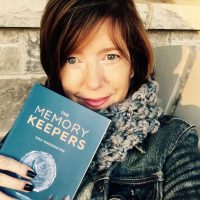Author’s Note: So many people are voicing their outrage at what is going on in the world, and then in the next breath they are divisive. In an attempt to bring people all to one side, I write this. My hope is not to further divide, but to bring on small steps of knowledge for a large group of people who don’t seem to realize the pain, division, and actions their words cause.
~
Why are people so afraid of acknowledging their privilege?
It baffles me; it’s becoming increasingly clear to me that one of the main issues with the division in our society is the enormous group of people who immediately get their back up when called out on minor things—especially when their privilege is called out.
They’ll post little comments on Facebook, a GIF, an image they deem funny; or videos that show an unfavorable view on a progressing movement. They share it out, further perpetuating a negative ideal.
Here’s the thing: we are consistently in a position of privilege. It’s why we feel validation by liking a post, then going back to “Grey’s Anatomy.” It’s why we can post these things and then walk away, not giving it a second thought.
Privilege is not a bad word; it shouldn’t be whispered within dark corners or admitted only to the closest friends.
It’s something we need to talk openly about.
People don’t want to admit their privilege, perhaps in fear of the perception that their road through life will be deemed easier than others. They worry that it’ll make them appear weaker; that they didn’t have to work as hard.
I’m not diminishing your struggle, rather highlighting one fact.
We could have a whole slew of reasons why we struggled: trauma, roadblocks, poverty, sexual orientation, but quite simply, our barriers and trauma weren’t based on our race, and that’s what is inherently different. Being white can’t be a reason we struggled.
There are hundreds of factors that can play into the difficulty of our adventure of life—being white is not one of them.
When you feel like you and a friend or an acquaintance or colleague or stranger faced equal hardships, I challenge you to dig deeper into that thought. When you get triggered when someone calls out privilege, I challenge you to understand why you are called out in the first place. If you are quietly watching from the sidelines and have yet to publicly make up your mind, I challenge you to read and reflect.
Acknowledge that BIPOC perpetually deal with more—entirely because of the color of their skin.
I’ve developed the beginnings of a list; I’d love to add to it. This is just a start. Please comment with other pieces, and I’ll continue to add.
Here are things that are based only on race:
>> A history of inequities in where people could simply live.
>> What banks, if any, would give them mortgages.
What neighbourhoods made available to them, Or where they might live comfortably and not be prejudiced against.
The socio-economic demographic of such neighbourhoods.
The social programs, recreational programs, the resources or LACK THEREOF in such neighbourhoods.
The quality of the schools in such neighbourhoods.
Generational trauma. And all the extra turmoil that comes just with that.
Stories of violence towards family and friends or strangers who look like them.
Stories of BIPOC being targeted, or jailed, or killed.
Stories of segregation, (Still now….yes…segregation.)
Being fearful always, because people can see their colour, but BIPOC can’t necessarily see others’ hate.
Stories and experiences with people of authority, What they did to them, or said to them, or did to others.
Rumours of violence. Videos of violence. Stories of violence. Experiences of violence
The fear that the continuum of those stories does to one’s mind, even if they haven’t experienced the violence first hand. The incessant what if?
Then finding police officers in their schools and the recurring reports of those authority figures, drowning out their ability to learn and thrive.
When one person is judged for an entire race, negative assumptions developed:
of their intelligence,
of their knowledge,
of their experiences,
of their interests,
of their abilities,
of their importance,
of their intentions,
of their sexuality,
of their religion,
of their ancestry.
An education system that, quite literally omitted their history,
An education system that pushed them away from academia,
An education system that preached equality and asked for input, but ignored their feedback, instead resorting back to white academics for that.
An education system that did not take the racism seriously within that institution. That pushed policy and public perception over progress.
Forcing them to listen to curriculum that was wrong,and the quiet disgust that they lived with knowing their peers thought this history to be truth.
Listening to curriculum that ignored them.
Or misrepresented them.
Teachers who claimed to be progressive, but their words made them cringe.
Watching their peers stare at them when taught about residential schools.
Ignoring the eyes when the “n” word was read aloud, and the educator not making a teachable moment in the reading of “fine literature,” like To Kill a Mockingbird, further perpetuating the white saviour image, so blatantly and consistently thrown at them.
“Thank goodness the white man saved them.”
Outrage if they complained.
Outrage if they didn’t.
Racist imagery being debated rather than taken down.
Racist words being debated rather than forbidden.
Racist words becoming an accepted norm in the halls of their school.
And the power authorities allowing that, because they resorted back to the white academics for advice again.
Unattainable scholarships, or the assumption of mismanagement if they got one fair and square.
Assumptions that high grades = teachers who were easier on them.
Assumptions of high grades = nepotism. Or worse.
And as such, they would be encouraged to take courses far below their abilities.
Sending them into occupations, with lower pay, and less room for growth.
An education system that would encourage basketball over physics. Or rap over violin, or hip hop over ballet,
(And if they picked ballet, they would be told to straighten their hair, wear light pink leotards and pointe shoes that clashed with their skin. They would be told that their body wasn’t quite right for ballet. That their butt was too big. In fear of being called out, they would be included, but in the back row.)
Beauty products that promoted, changed, altered them to be more “white,” which was deemed, “better.”
A whole lifetime of images of white beauty in popular media.
Inability to get products for their skin tone and hair texture. Words like, “dark people don’t wear makeup.”
Assumptions that lighter, narrow nose, slimmer face, were more beautiful.
Constant negative representation in literature, film and media, and the popular discourse that “other” is bad.
the perpetual feeling of being labeled as other, ∴ bad.
They grew up with:
Stares,
Comments,
Slurs,
Assumptions,
Poverty,
Mental Health which wasn’t supported,
They would have inequities in health care,
They would wait longer when they went places, or sometimes be turned away.
They wouldn’t be given loans or mortgages.
They would be forced to stay in the neighbourhoods with less opportunities.
They could go months without any conflict and then suddenly find hate hurled at them because of rebranding of a pancake mix. Yes. Hate because of pancakes.
Let THAT sink in. Ever been blamed for the rebranding of racist paraphernalia? No, I didn’t think so.
Being forced into silence because their words would be misconstrued by others.
They’d be “that black bitch.”
“The angry black man.”
“The thug.”
The outspoken one.
BUT, if they didn’t speak up, they’d be blamed for not voicing their concerns and educating others. As if that was their job.
All the stereotypes all tattooed upon them.
Further alienated again.
Tattoos that follow them everywhere they go.
So again, I challenge you.
Will you still argue your case?
Can you not see your privilege now?
Did you grow up with those things?
Do you continue to suffer with society’s inherent bias towards you, based solely on the fact that you wake up every morning?
Here’s the thing folks. Racism is racism. I would argue that being blind to one’s privilege is an inability to pick sides. Having mildly racists ideas is just as harmful as the overt racism we see on tv. You can’t have one foot in each room. You can’t claim to be accepting, but then be divisive too. What is helpful is that we all begin to accept our privileges and be mindful of them.
Let’s not get our backs up when we are called out on it, because really this is not about you and me, rather it is about legitimizing the barriers our society has put up in front of others. It’s about owning our piece of those barriers, and helping push them away.
Before making generalizations, let’s pause and be mindful of our journey and the privileges awarded to us, that allow us a trending white, biases.
Wouldn’t it just be more supportive to learn about their perspectives, than arguing our popular, privileged, point of view?
Acknowledging privilege is powerful.
So choose to do that.
Validating someone’s journey is powerful too.
So do that too.
Those choices transfer power to the oppressed. And there is nothing racist about that.
End point.
That’s all for now.
~ nina












Read 0 comments and reply